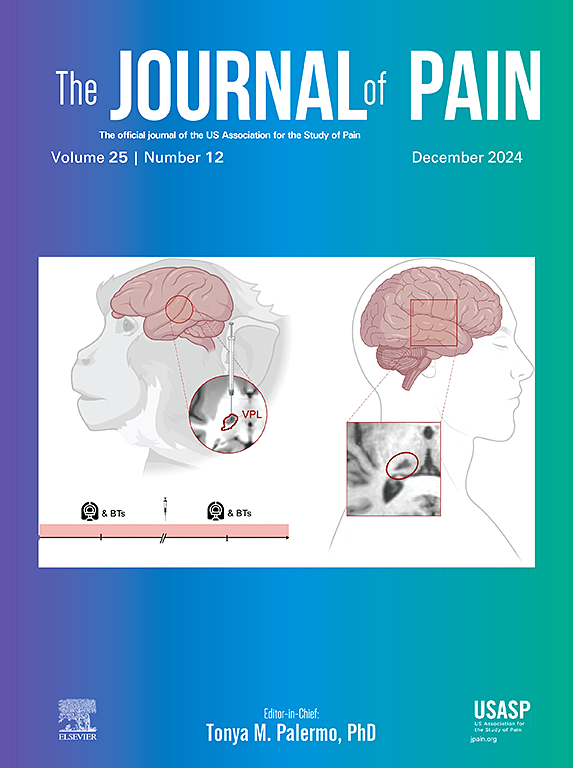疼痛心理诊所中的邻里劣势与疼痛相关体验:疼痛灾难化和与疼痛相关的恐惧的中介作用》(The Mediating Roles of Pain Catastrophizing and Pain-Related Fear.
IF 4
2区 医学
Q1 CLINICAL NEUROLOGY
引用次数: 0
摘要
本研究调查了疼痛心理诊所中以地区贫困指数(ADI)衡量的邻里劣势与疼痛相关变量之间的关系。我们还研究了疼痛灾难化和疼痛相关恐惧对这些关系的连续中介作用。参与者(N = 509)填写了调查问卷,评估通常的疼痛强度、疲劳、情绪困扰和对日常活动的干扰。ADI 平均得分为 32.57(SD = 22.65),分值从 1 到 100 不等。线性回归分析(调整年龄和性别)显示,较高的 ADI(即较少的优势)与较高的疼痛相关变量得分显著相关(疼痛强度:B = 0.026,p本文章由计算机程序翻译,如有差异,请以英文原文为准。
Neighborhood disadvantage and pain-related experiences in a pain psychology clinic: The mediating roles of pain catastrophizing and pain-related fear
This study investigated the relationship between neighborhood disadvantage, measured by the Area Deprivation Index (ADI), and pain-related variables in a pain psychology clinic. We also examined the sequential mediating roles of pain catastrophizing and pain-related fear on these relationships. Participants (N = 509) completed questionnaires assessing usual pain intensity, fatigue, emotional distress, and interference with daily activities. The mean ADI score was 32.57 (SD = 22.65), with scores ranging from 1 to 100. Linear regression analysis, adjusting for age and gender, revealed that higher ADI (i.e., less advantage) was significantly associated with higher scores on pain-related variables (pain intensity: B = 0.026, p < .001; fatigue: B = 0.018, p < .001; emotional distress: B = 0.020, p < .001; interference with daily activities: B = 0.014, p = .006). Sequential mediation analysis revealed pain catastrophizing and pain-related fear mediated these relationships, with significant indirect effects for fatigue (B = 0.001, 95% CI [0.000, 0.002]) and interference with daily activities (B = 0.001, 95% CI [0.001, 0.003]) — but not pain intensity or emotional distress. Pain catastrophizing alone mediated neighborhood disadvantage-pain relationship for all variables. The results suggest that neighborhood disadvantage is associated with higher scores on pain-related experiences and that consistent with the fear avoidance model, pain catastrophizing and pain-related fear may play a role in these relationships for fatigue and interference with daily activities. These findings underscore that neighborhood disadvantage is associated with worse pain-related experiences and highlight the importance of considering neighborhood factors in chronic pain management.
Perspective
This study identifies potential pathways linking neighborhood disadvantage to chronic pain variables, highlighting the roles of pain catastrophizing and pain-related fear. The findings underscore the need for a holistic approach to pain management that recognizes both individual cognitive-emotional factors and the broader social context in which pain occurs.
求助全文
通过发布文献求助,成功后即可免费获取论文全文。
去求助
来源期刊

Journal of Pain
医学-临床神经学
CiteScore
6.30
自引率
7.50%
发文量
441
审稿时长
42 days
期刊介绍:
The Journal of Pain publishes original articles related to all aspects of pain, including clinical and basic research, patient care, education, and health policy. Articles selected for publication in the Journal are most commonly reports of original clinical research or reports of original basic research. In addition, invited critical reviews, including meta analyses of drugs for pain management, invited commentaries on reviews, and exceptional case studies are published in the Journal. The mission of the Journal is to improve the care of patients in pain by providing a forum for clinical researchers, basic scientists, clinicians, and other health professionals to publish original research.
 求助内容:
求助内容: 应助结果提醒方式:
应助结果提醒方式:


